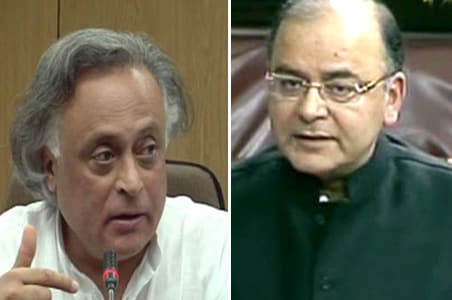
New Delhi:
The Opposition has slammed the government on the Copenhagen Accord, saying the document betrays developing nations and has not protected India's interests.
"If the document had said what the Minister assured the House, that it will only be reporting and nothing else, I would have nothing to say. But again the Sharm el-Sheikh syndrome takes place. The documents say something else," BJP's Arun Jaitley said, alluding to the controversial joint statement signed by the prime ministers of India and Pakistan in Sharm-el-Sheikh, Egypt, earlier this year.
Jaitley accused the government of having let developed countries off the hook as far as their commitments under the Kyoto Protocol were concerned. "It appears to be a complete betrayal of the poorer nations. After all, negotiation is a process by which you create value for your country. Negotiation is a process by which every word has to be measured," Jaitley said.
He said the accord had opened up India's domestic actions on climate change to possible international scrutiny in the future. He asked the government to clarify "consequences under the guidelines (of the accord)".
The BJP leader said the government had been "outwitted" in the drafting of the document, and said it was a "US-BASIC" accord, rather than an accord among all 192 nations attending the summit. BASIC countries are Brazil, South Africa, India and China.
US and the BASIC countries had reached a legally non-binding agreement on cutting greenhouse gas emissions and capping the rise in temperature to 2 degree Celsius during the Copenhagen meet.
Jaitley's scathing attack came after Environment Minister Jairam Ramesh made a statement spelling out the main features of the Copenhagen Accord in the Upper House and stressed that it was not legally binding and put no quantifiable emission targets for developing countries.
He said the Copenhagen Conference decided to continue negotiations under the mandate of the Kyoto Protocol and Bali Action Plan to be completed at the end of 2010.
Ramesh sought to assure the House that India's non-negotiables had not been compromised. "We have been able to incorporate a specific provision that these clearly defined guidelines will ensure that national sovereignty is respected. This is not an empty sentiment, these are actual words written in the accord," he said.
A senior White House adviser, considered to be close to the US president, has said the accord allows America to review and challenge India and China on voluntary action. White House adviser David Alexrod said: "Now, China and India have set goals. We are going to be able to review what they're doing. We are going to be able to challenge them if they do not meet those goals."
But Ramesh sought to allay fears saying: "Axelrod is the Arun Jaitley of the Obama administration. He is their top 'spin doctor'. I go by what President Obama himself said and nowhere has President Obama said that this accord is meant to control or strangle India & China."
"If the document had said what the Minister assured the House, that it will only be reporting and nothing else, I would have nothing to say. But again the Sharm el-Sheikh syndrome takes place. The documents say something else," BJP's Arun Jaitley said, alluding to the controversial joint statement signed by the prime ministers of India and Pakistan in Sharm-el-Sheikh, Egypt, earlier this year.
Jaitley accused the government of having let developed countries off the hook as far as their commitments under the Kyoto Protocol were concerned. "It appears to be a complete betrayal of the poorer nations. After all, negotiation is a process by which you create value for your country. Negotiation is a process by which every word has to be measured," Jaitley said.
He said the accord had opened up India's domestic actions on climate change to possible international scrutiny in the future. He asked the government to clarify "consequences under the guidelines (of the accord)".
The BJP leader said the government had been "outwitted" in the drafting of the document, and said it was a "US-BASIC" accord, rather than an accord among all 192 nations attending the summit. BASIC countries are Brazil, South Africa, India and China.
US and the BASIC countries had reached a legally non-binding agreement on cutting greenhouse gas emissions and capping the rise in temperature to 2 degree Celsius during the Copenhagen meet.
Jaitley's scathing attack came after Environment Minister Jairam Ramesh made a statement spelling out the main features of the Copenhagen Accord in the Upper House and stressed that it was not legally binding and put no quantifiable emission targets for developing countries.
He said the Copenhagen Conference decided to continue negotiations under the mandate of the Kyoto Protocol and Bali Action Plan to be completed at the end of 2010.
Ramesh sought to assure the House that India's non-negotiables had not been compromised. "We have been able to incorporate a specific provision that these clearly defined guidelines will ensure that national sovereignty is respected. This is not an empty sentiment, these are actual words written in the accord," he said.
A senior White House adviser, considered to be close to the US president, has said the accord allows America to review and challenge India and China on voluntary action. White House adviser David Alexrod said: "Now, China and India have set goals. We are going to be able to review what they're doing. We are going to be able to challenge them if they do not meet those goals."
But Ramesh sought to allay fears saying: "Axelrod is the Arun Jaitley of the Obama administration. He is their top 'spin doctor'. I go by what President Obama himself said and nowhere has President Obama said that this accord is meant to control or strangle India & China."
Track Latest News Live on NDTV.com and get news updates from India and around the world

